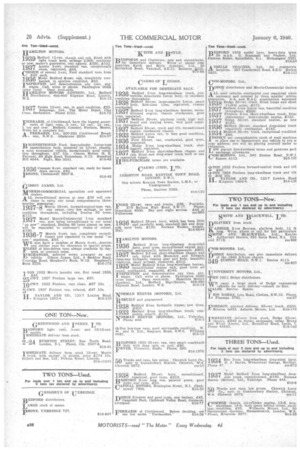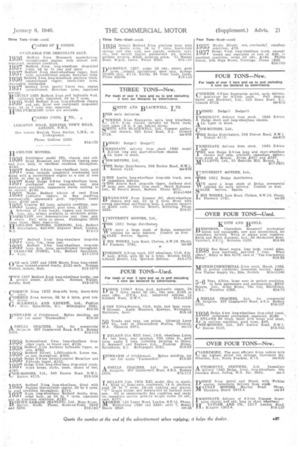NOTTINGHAM TO SPEND 131,200 ON BUSES.
Page 46

Page 47

If you've noticed an error in this article please click here to report it so we can fix it.
June of last year Nottingham Corporation approved a report as to the raising of additional capital for the purchase of 12 public-service vehicles. In order to provide machines for additional services, the passenger transport committee has decided to purchase 16 buses.
The committee instructed the general manager to negotiate with the Associated Equipment Co., Ltd., and the Metropolitan-Cammell Carriage and Wagon Co., Ltd., for an extension of the present contracts and the committee has now agreed to purchase 16 940 A.E.C. chassis and a similar number of bodies from the MetropolitanCaminell concern.
The total cost of the 16 vehicles, recommended to be purchased out of loan, is £31,200.
LONDON TRANSPORT'S 1939 PROGRAMME.
DURING the past year, London Transport added 83 double-deckers, 17 single-deckers and 262 coaches to its fleet. These vehicles provided for replacements and new and extended routes. During the present year, an additional 340 buses and 87 coaches are provided for in the programme. TROLLEYBUSES PUTTING PAID TO TRAMS QOME idea of the rapid progress
which is being made by the trolleybus, mainly in municipal spheres, is contained in a statistical return recently issued by the Minister of Transport, in which particulars of the accounts and returns of tramway and trolleybus undertakings in Great Britain—excluding those of London Transport—are given. They cover the year ended December 31, 1937, for companies, and March 31, 1938, for local authorities. The return shows that the aggregate number of passenger journeys made on trolleybuses• during 1937-38 was 496,850,916, an increase of 67,435,735—equal to 15.7 per cent.
over the previous year. In the same period, passenger journeys on tramcats fell by 4.75 per cent.
In our next issue we shall include a brief analysis of the trolieybus returns.
WHY DRIVERS CANNOT GIVE THEIR SERVICES FREE.
A N offer by the drivers and con1–iductors at the Grays depot of the Eastern National Omnibus Co., Ltd., to forgo payment when operating buses for a children's outing, had to be refused by the company owing to the matter, of insurance cover.
This has raised a point in connection with the company's policy of not paying the men for the first 15 minutes of overtime. Their retort to the company is that, not being insured, as they are not being paid, they are liable to prosecution.
The men's Union is being asked to negotiate with the company and the result will probably be known tomorrow. It is understood that, in any case, the men will take the necessary steps to protect themselves.
BIRMINGHAM'S NEW £100,000 BUS ORDER.
BIRMINGHAM Corporation is to invest £100,000 in Leyland buses equipped with hydraulic transmission. The municipality Will thus have expended approximately £190,000 on this type of bus in the past 12 months. The latest order which has just been placed with Leyland Motors, Ltd., is for 50 oil-engined chassis and a similar number of double-deck metal-framed bodies. Birmingham now has on order 135 Leyland buses with hydraulic transmission, and 85 of them will be put into service early in this year.
The type of body chosen for Birmingham's latest class of vehicle will have a straight staircase to the upper saloon, and will embody an unusual feature in the form of a luggage carrier actually inside the lower saloon, this taking the place of a seat over the offside rear wheel-arch.
TAXIDRIVERS DEMAND HIGHER WAGES •
A HUNDRED taxicab drivers, em
ployed by John Paterson (Motors), Ltd., of Glasgow, the city's biggest hiring concern, came out on strike on December 30, to enforce their. demand for highei wages. The management at first 'declined to negotiate with the Horse and Motormen's Association, of which the men are members. Later in the day, however, it was intimated that the company was prepared to discuss the matter with the Association this week and, on this understanding, the men resumed work.
The company has intimated that extra workers, taken on during the run of the Empire Exhibition, had been retained, although there was no great demand for their services and that 25 of these men would, in any case, be dispensed with, BUSES. AS MOBILE COMMITTEE ROOMS.
TWO single-deck buses which were, until recently, in regular passenger servic,in East.Norfolk, have been converted' into mobile committee rooms. The East Norfolk National Conservative and Agricultural Association is organizing a fleet of such vehicles in connection with the forthcoming election in the area. Each bus is provided with office equipment and loudspeaker installation.
BUSES REPLACE TRAMS IN DUBLIN.
ON Sunday last, the Dublin United Tramways Co., Ltd., put 13 doubledeck buses into service on the old Cabra to Palmerston tram route. This represents the fourth tram route which has been abandoned in favour of buses, the others being the Phoenix Park-Ballybough, Nelson Pillar-Dollymount and O'Coitnell Bridge-Parkgate Street.
It is anticipated that the Nelson Pillar-Sandyrnount and the CollegeGreen-Inchicore trams will, in the near future, be replaced by buses.
RAILWAY COMPANIES DEFINE FANTAIL POLICY.
THE policy of the railway companies, in relation to fantail tours—now generally limited by the appeal decision to what, in common parlance, is a one-feather tail — was officially revealed to Mr. W. Chamberlain, chairman of the North Western Traffic Commissioners, at a public sitting in Manchester on Friday Last.
At a recent sitting, when difficulty arose through the opposition of the railway companies on a renewal, Mr. Chamberlain asked the railway representative to outline the policy of the railway companies in regard to these long-distance, all-in tours. At the time, the representative was not prepared to tie himself down to any specific wording, but he promised to enlighten Mr. Chamberlain later.
These are the terms of the policy as
announced on Friday last :—With regard to such tours as are already authorized, tlie railway companies consider that only the tour of the one local trip should be allowed, but the inclusive charges should remain as hitherto. A condition should be attached to the licence, stipulating that only such passengers should be carried on the tours as had paid the total inclusive charges to cover the return journey between the terminals, meals en route, accommodation at hotels and boarding houses, and each local excursion shown in the adyertisements of the tours.
DEATH OF LEICESTER'S LATE • TRANSPORT MANAGER.
THE former general manager of Leicester City Transport Department, Mr. Harry Pool, died on Boxing Day, at the age of 62 years, Mr. Pool had had ill-health since February, 1936, and in September of that year he retired, being succeeded by Mr. Benjamin England. He entered the service of the Leicester Tramways Co., in 1890, as a junior clerk in the accounts department, and he was chief clerk and cashier when Leicester Corporation took over the undertaking in 1901.
In 1926 he became assistant general manager and, two years later, general manager.
His eight years as general manager were principally noteworthy for the remarkable increase in the extent of the bus services operated by the transport undertaking. Although brought up in the tramway • tradition, Mr. Pool was largely responsible for bringing many new bus routes into existence.
FUTURE OF BELFAST MUNICIPAL SERVICES
IN a report to the transport committee of Belfast Corporation, Major McCreary, general manager and engineer, records his views with regard to the proposals of the McLintock Committee that the Belfast services should be absorbed in the proposed scheme for the unification, of all transport in
• Northern Ireland. .
Major McCreary states : !' The unsoundness of the proposed absorption is accentuated by the fact that, not only is freight transport in the city excluded from the scheme, but prcivision is made to afford local carriers full protection by the introduction of a comprehensive system of licensing for goods vehicles." " If,by 'virtue of the difference in the nature of freight traffic in city and' country, it was considered in the best interests of everyone to exclude the local carriers, or, it was held to be impossible to effect any economies by embracing them in the proposed scheme of unified control, how much more so is it not the case in dealing with passenger traffic?"
"The solution of the problem, insofar as it concerns the municipal undertaking is, in my opinion, the continued grant of full powers for co-ordination of services by working agreements between the corporation and the body appointed to control transport in the remaining area. Under such an arrangement it will at all times, as in the past, be my earnest endeavour to co-operate and assist in every way possible."












































































